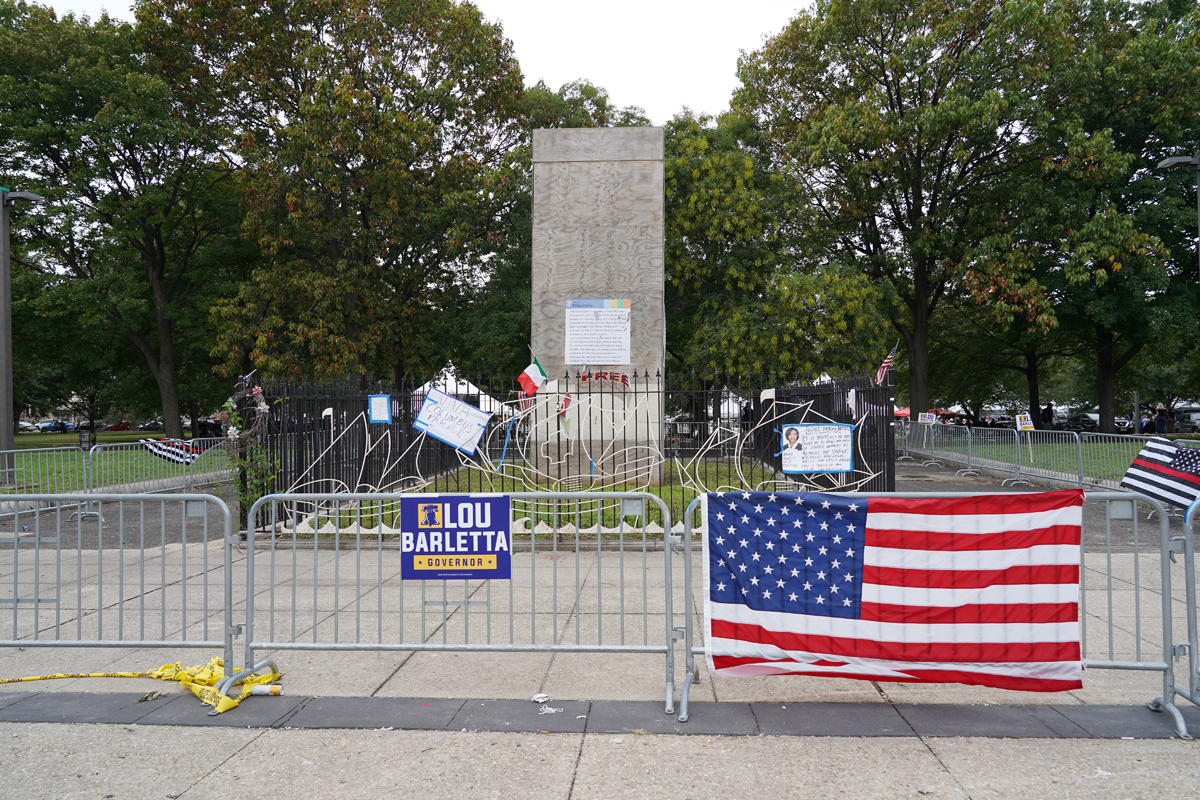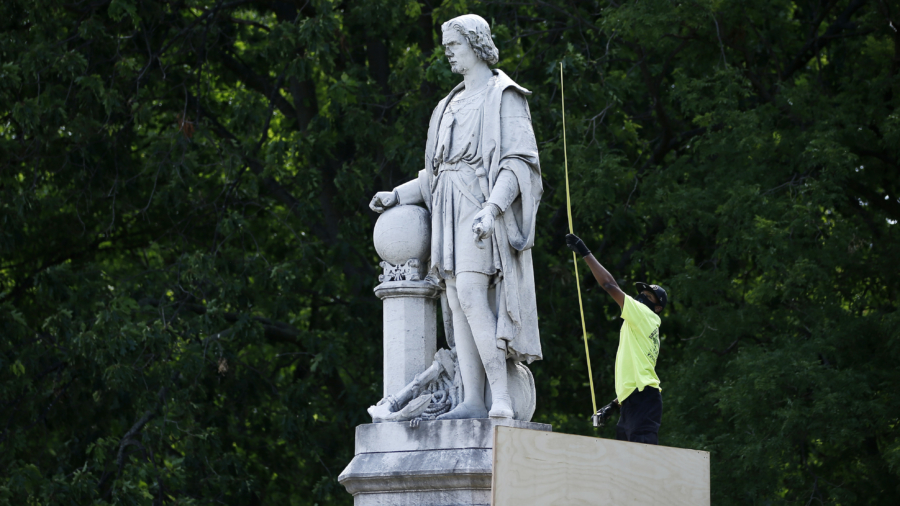Workers in Philadelphia have removed the box that had been covering a Christopher Columbus statue since clashes in 2020 between supporters of the monument and opponents who say it stands as a symbol of white supremacy.
Workers completed the work on Dec. 11, video footage from Marconi Plaza showed.
The box, which bore the colors of the Italian flag, was removed via crane as onlookers cheered.
A Commonwealth Court of Pennsylvania panel ruled recently that the city must take down the box around the 10-foot-tall marble statue, which was presented to the city in 1876 by the Italian American community in honor of Columbus, an Italian explorer, and designated as a historic object by the Philadelphia Historical Commission in 2017.
The panel found that the city violated a rule governing how public input is received on a proposal to remove public artwork.
Background
The Columbus statue was installed in 1876 at Fairmount Park and was moved to the plaza in 1982. It’s the endpoint for the city’s annual parade on Columbus Day, a holiday now known as Indigenous Peoples’ Day in Philadelphia and some other jurisdictions.
After clashes around the statue in the wake of George Floyd’s death in 2020, Philadelphia Mayor James Kenney, a Democrat, asked art officials to start a process to remove the statue. Along with his discoveries, Kenney noted, Columbus enslaved natives.
“Surely the totality of this history must be accounted for when considering whether to erect or maintain a monument to this person. I believe that a public process allowing for all viewpoints, especially those of indigenous people whose ancestors suffered under the rule of European settlers, to be in the best interest of the City,” Kenney wrote at the time.
After the process, the historical commission voted to remove the statue, claiming that keeping it up would endanger public safety. Several residents objected, but their appeal was denied because they hadn’t raised issues during the commission hearing that included the vote. The objectors then lodged a lawsuit, arguing the commission didn’t follow the law in the removal process in part because it didn’t wait 90 days to receive public comment as required.
Court of Common Pleas Judge Paula Patrick found in favor of the objectors, saying the commission didn’t analyze attributes of the statue and fully consider the effect of its removal. Patrick also said the commission didn’t rule on adequate evidence “to conclude that public safety was or is an ongoing concern.”
“It is baffling to this court as to how the City of Philadelphia wants to remove the Statue without any legal basis. The City’s entire argument and case is devoid of any legal foundation,” Patrick wrote in her decision.
The city appealed the order, arguing that the commission’s vote was proper and shouldn’t be blocked.

Rejection
In the recent ruling, the commonwealth panel said the city clearly failed to follow Directive 67, which states that the public input process must last at least 90 days.
“The Office of Arts’ application to remove the Columbus statue from its current site before completion of the period for public input violated Directive 67. This cannot be remedied except by starting the public input period over and waiting until it is complete before the Office of Arts takes any further action with respect to the removal of the Columbus statue from Marconi Plaza, such as the submission of a new application to the Historical Commission,” wrote Judge Mary Hannah Leavitt, writing for the majority.
Leavitt also said the city could have implemented alternative courses of action, such as placing plexiglass around the statue or monitoring it with video surveillance.
In a dissent, Judge Michael Wojcik said that the directive was suspended before the proposal to remove the statue.
“As a result, it cannot provide a basis upon which the trial court below could reverse the City’s administrative decisions authorizing the statue’s removal in an appeal to that court from those decisions,” he said. “Accordingly, unlike the Majority, I would reverse the trial court’s order in this matter.”
Reaction
George Bochetto, an attorney who represents people who support keeping the statue, said that he was pleased both courts “have boldly reaffirmed that the rule of law still matters.”
“That we are not a society ruled by cancel culture mobs. That all ethnic groups can proudly protect and honor their diverse heritages,” he added.
A spokesperson for the city said that it was “very disappointed” in the new ruling.
“We continue to believe that the Christopher Columbus statue, which has been a source of controversy in Philadelphia, should be removed from its current position at Marconi Plaza,” the spokesperson said in a statement. “While we will respect this decision, we will also continue to explore our options for a way forward that allows Philadelphians to celebrate their heritage and culture while respecting the histories and circumstances of everyone’s different backgrounds.”
From The Epoch Times


